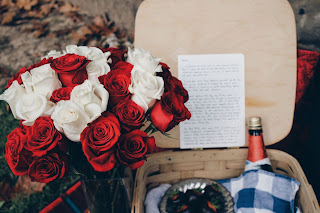The importance of writing love letters.
It’s now April, but recently I wrote about why the romantic comedy Letters to Juliet is my favorite February movie. Since this weekend was horrible weather-wise, and my revisions for the third book in my Deadly Force series were going slowly, I decided to rewatch the movie to cheer myself up. Then I decided to edit and repost the article here.When the heroine finds the heart-sick letter, she goes on a quest to reunite the lovers. In the process she learns what true love really means.
I’m not normally a fan of romcoms, but I love this movie. Maybe it’s because, beside being a planner girl, I'm an avid letter writer myself. Or maybe because I’ve been to Juliet’s courtyard in Verona, Italy and to the countryside where the movie was filmed. Or maybe it’s because I’m a huge fan of not just Shakespeare’s play “Romeo and Juliet” but also of one of the original source materials titled “Giulietta e Romeo” by Luigi da Porto in 1524. So much a fan that my debut novel EVERY DEEP DESIRE is a romantic suspense Romeo and Juliet retelling.
 |
| Statue of Juliet in her courtyard in Verona, Italy. |
Years later, in the late medieval/early Renaissance periods, love letters appeared during the Age of Chivalry. This was also the advent of Irish and Welsh cycles of poetry which included mythical stories of The Fianna, King Arthur and the Knights of the Round Table. All of these stories told tales of romantic missives sent from far-away soldiers to their lady-loves. As these stories spread and grew in popularity, those who could read and write began sending their own love letters. These letters were passionate-yet-chaste letters of courtly love. Filled with compliments and self-doubt, these letters drove both the sender and the receiver to the outer edges of romantic tension.
This concept of courtly-yet-unrequited love continued up through the Eighteenth Century. Love letters found during this time are more personal, yet still chaste and pure, including letters between President John Adams and his wife Abigail. In the early eighteen-hundreds, Ludwig van Beethoven wrote his Immortal Beloved letters to an unknown woman. To say they’re passionate would be an understatement.
It’s not until the later nineteenth-century that love letters became more . . . erotic. Some say it was in response to the proprieties enforced during the Victorian Era, others believe it was due to the desperation caused by industrialization and the growing number of violent conflicts around the world.
Regardless of why, as time progressed into the Twentieth Century, love letters became more personal and more interesting. In 1952, computer scientists at Manchester University built their Mark One computer not to crunch numbers but to write love letters including this gem, “My lust tempts your fond ardour. My liking ardently cares for your hunger.”
Now, in the Twenty-First Century, we have text emojis and screen swipes. Yet in spite of the technology, last year a record number of Valentine’s Day cards were bought and sent. And even the sales of personal stationary rose.
And that gives me hope. As I re-watch Letters to Juliet, I like to think that the art of writing letters, especially love letters, hasn’t died. Although technology adapts, people don’t change. We crave intimacy, not just through physical touch, but from the profound emotions found only in well-written words. May we all be Secretaries of Juliet, even if the words are crunched out by a love-sick computer in Manchester, England.
---------------------
Her acclaimed debut book EVERY DEEP DESIRE, a sexy, action-packed retelling of Romeo and Juliet, is about an ex-Green Beret determined to regain his honor, his freedom, and his wife.
EVERY DEEP DESIRE is available on: Amazon | Barnes and Noble | iBooks | IndieBound| Kobo| Google
And adding it to your Goodreads TBR list is also always appreciated!







Thankfulness to my dad who informed me relating to this blog, this website is really amazing.
ReplyDeleteBDSM porn
The stuff in this blog is in not only incredible but also providing the great knowledge to the people.
ReplyDeleteAnal porn